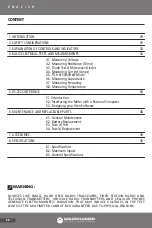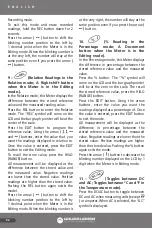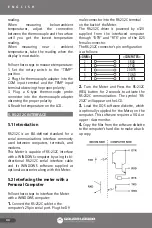
E N G L I S H
37
negative (or lower voltage) side of the
circuit, a minus sign will appear on the
display, at the left.
7. Disconnect power to the circuit before
removing the test leads from the circuit.
4.1.2. Measuring AC Volts
Follow these steps to measure AC Volts:
1. Set the function and range switch to the
desired AC V range. If you do not know the
value of the voltage to be measured, always
start with the highest range and reduce the
setting as required to obtain a satisfactory
reading.
2. Plug the red test lead into the “VΩHz
CAP” input terminal and the black lead
into the “COM” input terminal of the
instrument.
3. Disconnect the power form the circuit to
be tested.
4. Connect the test leads to the circuit to be
tested.
5. Reapply power to the circuit, the
measured voltage will appear on the display
of the instrument.
6. Disconnect power to the circuit before
removing the test leads from the circuit.
Three-Phase AC Volts
This Meter is designed to primarily measure
household AC voltage. When measuring
THREE-PHASE circuits line-to-line, the
value of the voltage is actually higher
than the rated line-to-ground 3-phase
voltage. It is very important that you do
not exceed the maximum AC (RMS) rating
of this Meter, 750V AC. To find the RMS
voltage lineto-line on a 3-phase power line,
multiply the rated line-to-ground voltage
by the square root of 3 (approx. 1.732).
For example, if you connect this meter
to a 480 volts 3-phase line (i.e. 480V line-
toground), the total available voltage line-
to-line is about 832V AC ( 480V x 1.732).
Severe damage and a dangerous shock
hazard could result because this exceeds the
rating of this Meter.
4.2 Measure resistance (Ohms)
CAUTION: TURN OFF POWER AND
DISCHARGE ALL CAPACITORS ON CIRCUIT TO
BE TESTED BEFORE ATTEMPTING INCIRCUIT
RESISTANCE MEASUREMENT. FAILURE
TO DO SO MAY END UP IN EQUIPMENT
(AND/OR INSTRUMENT) DAMAGE. THE
RESISTANCE MEASURING CIRCUIT APPLIES
A KNOWN VALUE OF CONSTANT CURRENT
THROUGH THE UNKNOWN RESITANCE AND
THEN MEASURES THE VOLTAGE DEVELOPED
ACROSS IT. THEREFORE, REMOVE ALL
POWER TO THE CIRCUIT UNDER TEST WHEN
MAKING RESISTANCE MEASUREMENTS.
IF ANY VOLTAGE IS PRESENT IN THE TEST
CIRCUIT, AN ERONEOUS READING WILL
RESULT. THIS METER MAY BE DAMAGED IF
VOLTAGE IN EXCESS OF 600V AC IS PRESENT.
NOTE:
When measuring critically low ohm values,
touch tips of test leads together and record
the reading. Subtract this reading from any
additional measurement to obtain the most
accurate value.
• When measuring large resistance, reading
















































